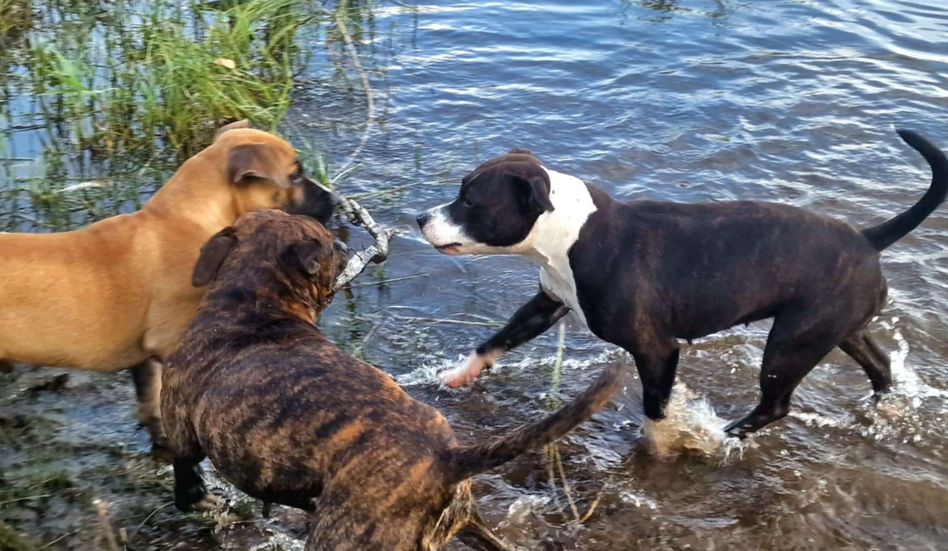🐾 Codi, Caly, and Coba: Naming, Routine, and Kinship Series
- Four Legged Anthropologist

- Aug 5, 2025
- 2 min read
"They suit me perfectly and keep me happy."
Codi, Caly, and Coba, the three lovely staffies are the perfect trio of models for @ThreeCsStaffies. Each name carries a unique story. Codi is a shortened version of "Kodachi" but with a C---to match the owner's first and beloved dog, Cole. A kodachi is a short sword and was chosen because Codi was "teeny tiny". Caly was named after the goddess Calypso and the owner's favorite drink. Finally, Coba, chosen just because it felt right.
Names as Meaning
Anthropologists often explore how names hold meaning---not just in human families but across cultures and other species as well. Here, naming serves the purpose of creating identity and continuity. Giving dogs names with a deep symbolic or emotional meaning is a way humans include their pets into their kinship systems, treating them as full members of the family.
Rituals, Routines, and Shared Life
@ThreeCsStaffies' daily routine is full of predictable patterns full of work, couch time, play time, and birthday celebrations. For their birthdays, they get sung happy birthday, a delicious doggy cake, and new toys to destroy. These kinds of celebrations and routines are rituals, no matter how simple. In anthropology, even small rituals are important since they're used to affirm roles and relationships---even between humans and animals.
Dogs as Family and Identity
Many dog owners, including @ThreeCsStaffies, consider their dog(s) as part of their family, whether as a child, sibling, etc. This relationship represents how pets often become part of a human's kin.
"My dogs are definitely my family. I know them to be what they are which is dogs so although I would call them my babies and family I am of course appropriately understanding that they are indeed deer sh*t eating animals."
The consideration of dogs as "family" and kin while still acknowledging the fact that they are still dogs is another fascinating feature of human-canine bonds, reflecting the deep emotional bond people share with their beloved dogs while also still highlighting the complexities of the human mind in assigning relationships.
Reflection and Complement
[Summarize how the dog’s personality or breed traits match or differ from their human. Reflect briefly on how people often choose or bond with animals that complement their own identity.]
The dog owner said that her staffies "suit her perfectly". They love their runs, walks, and play time, but they're not too over the top energy wise. Despite staffies being known for being very energetic, these three have adapted perfectly to her life. They're "clever cookies", and they adore her niece. Clever, calm, affectionate, and full or personality, anthropologists might say this reflects the mirroring of identity: dogs are often chosen or cherished because they reflect or balance aspects of our own personality, character, habits, or needs.
"I love them so much."
This dog owner speaks for dog owners all around the world. This is a love that transcends the species boundary. It's a bond that doesn't just shape daily life, but identity, memory, and meaning.
Anthro Note: Anthropologists study more than just humans — they explore the relationships, rituals, and identities that form between people and animals. Stories like this show how dogs become part of the cultural and emotional world we build.
Find @ThreeCsStaffies on Instagram!



















